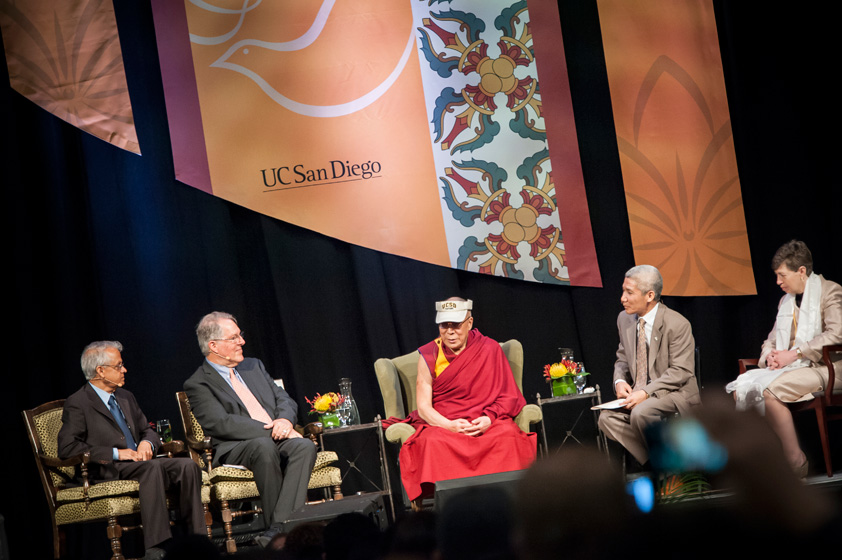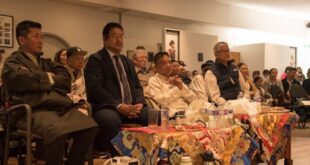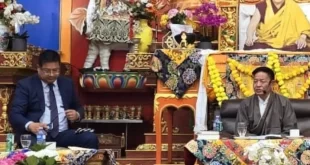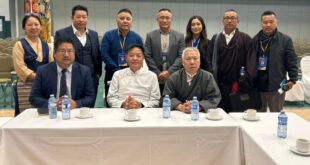San Diego, April 20–On his final full day in San Diego during this visit, on April 19, 2012 His Holiness continued with his theme of compassion without borders and spoke to a sold out crowd of 13000 people at the San Diego State University on upholding universal ethics and compassion. He also participated in a discussion on neuroscience and the emerging mind with scientists.
In the morning, His Holiness visited the Viejas Arena of San Diego State University and gave an interview to Maureen Cavanaugh of KPBS, the San Diego affiliate of Public Broadcasting Service. He responded to questions relating to compassion in the American society and on his devolution of political authority. This is being broadcast later in the day.
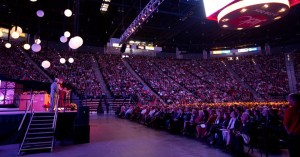
Thereafter, His Holiness entered the stage of the arena to a thunderous welcome from the people. Dr. Elliot Hirshman, President of San Diego State University, welcomed His Holiness to the event. Thereafter, San Diego Mayor Jerry Sanders presented His Holiness with the Key to the City. In a brief remark, the Mayor said, “Throughout his teachings, His Holiness encourages all of us to strive for a better future, through peace and compassion for others. With this key, we offer His Holiness a promise to keep working for a brighter tomorrow.” The Mayor said that His Holiness’ message of compassion and peace resonates with the citizens of his city.
Ms. Lauren Powell Jobs, in her introduction of His Holiness, said his message was that altruism to our spiritual wellbeing is a civic responsibility. She termed His Holiness a religious leader who includes and not excludes. She applauded the approach of His Holiness and the Tibetan people even in the face of “terrible experience of oppression that continues even to this day.”
His Holiness then began his talk on “Upholding Universal Ethics and Compassion in Challenging Times”
His Holiness said he usually began by calling everyone brothers and sisters, through which he wanted to indicate that we are truly the same human being. He said we have the same potential for construction and destruction. He said fear, jealousy, anger, frustrations, etc. ultimately bring destructive action, both physical and verbal.
His Holiness said the seed of compassion was in each and every individual. He said even animals like cats, dogs and birds respond to affections shown to them. He added that kittens and puppies could respond these form of biological compassion. He talked about newborn puppies whose eyes may not be opened but nevertheless looks for the nipples of their mother and feel happy once they find them and start consuming the milk. He said turtles might be an exception as the mothers don’t care for the eggs once they are hatched. With alligators, His Holiness said that he had noticed that the mother would watch from a distance as her egg hatches. These show that compassion was needed when life begins, he said, adding that compassion was essential even at the time life ends. He said showing of closeness feeling at the time of a person’s death will ease the process for the person and that money, power , fame, etc. are of no use at that stage.
His Holiness said from his own experience he knows that an affectionate feeling shown by others has a positive feeling in oneself. He talked about his experience with doctors saying some doctors merely seem to treat patients without much of a personal feeling. At such time, he said he gets the feeling that the doctor may merely be performing an experiment on him.
His Holiness suggested generating a feeling of oneness and recalled a chant that he had heard inHawaiirecently, the meaning of which was explained to him as being. “Your bone is my bone, your blood is my blood.” He said this was very meaningful and said that we need to have the feeling that “your life is my life, your health is my health.” He added that such an attitude was very useful.
Explaining that compassion was something that needed to be cultivated by oneself, His Holiness talked about his growing awareness of western societies since his first travel to Europe in 1973. He said Tibetans had the impression thatEuropewas highly developed. In fact, those Tibetans who settled in Switzerland in the early 1960s expressed that the country was indeed paradise. But through his subsequent travels toEurope, the United States, Canada, etc., he became aware of another reality that was beneath the beautiful surface. He learnt about problems of stress, alcohol, drugs, etc.
His Holiness said the situation in these countries clearly indicated that material development alone cannot bring about inner peace. He added that physical comfort couldn’t subdue mental affliction. On the other hand, if one is mentally calm, this can subdue any physical pain.
His Holiness also talked about the situation of gap between the rich and the poor throughout the world. He said during his visits to Africa and Latin America, he could see this condition. He said one of the issues affecting the world is corruption, which he said is the new cancer.
He said these problems come about because of a lack of self-discipline and training in moral ethics. Although there are people who say that moral ethics should be based on religion, His Holiness said such a situation would have limited effect as no one religion can claim universal acceptance. Since the problem, is universal, he said that we need to look for a universal solution. His suggestion was to look for an approach that is not grounded in religion. He said this was not a new idea as it has been a part of ancient Indian thoughts. He talked about the secularism that was promoted byIndiaand that this did not mean being against religion.
He said that children interact with each other without any thoughts of their respective background or social conditions. But as one grows up one begins to be taught about backgrounds and the earlier feeling of oneness becomes dormant.
Instead different feelings grow. He talked about the importance for people to make a distinction between these feelings. Competition in the sense of wanting to excel and to be at the top was good, but extreme competition that makes one desire worse outcome for others while wanting good for oneself was negative. Similarly, if one had extreme self-centered ego that disregarded other’s feelings it was negative while a sense of strong self in order to serve other people with infinite altruism is positive.
He said the feeling of desire that is mixed with attachment was destructive and shortsighted. Also, anger that comes out of a sense of concern for the wellbeing of others was positive while anger born out of ill feeling was negative.
His Holiness said people could understand the importance of the need to promote compassion through common experience, use of their common sense and through scientific findings about the connection between a healthy body and a healthy mind. He said calm mind could only be developed through warm heartedness.
His Holiness talked about the importance of training the mind in this and to remove grounds for fear. Some fear, he said, would be valid and gave the example of people living in Dharamsala being afraid of earthquake as it is in the earthquake zone. Under such a situation the fear leads people to take precaution, he said. His Holiness also talked about his visits to China and India in the 1950s and being nervous then while meeting the leaders in these countries. However, subsequently through increased familiarity as well as through training he was able to overcome the nervousness, he said. His Holiness said his tradition of dedicating his body, speech and action to the wellbeing of others every morning was helpful in transforming his mental state.
His Holiness said we needed to go away from the old concept of differentiating between me and others or we and they. Instead we need to think of a concept of Big We, with the entire seven billion people of the world being part of that.
His Holiness then answered some questions. When asked how could an individual make a difference in this world, His Holiness said change occurs because of the combination of effort by individuals. We need to think along these lines and to know that an individual’s effort can multiply. He said Jesus, Buddha and Mahavira, etc. were all individuals, who were able to make a difference.
A questioner asked about the most important thing to achieve in life. His Holiness responded by saying that in terms of the humanity in general, it would be a peaceful life. At the individual level, he said that those believing in theistic religion would want to go to heaven. Since he is a Buddhist, His Holiness said many Tibetans would like to achieve Buddhahood in three years, which is unrealistic. But he said he was realistic and was striving to achieve the same in eons.
Asked about the biggest inspirations in his life, His Holiness said since he is a Buddhist he may be prejudiced, but the Buddha is his inspiration. In modern times, he said Mahatma Gandhi is his inspiration adding that he had not met Gandhi, except in a dream. He added that he also admired Vaclav Havel, Mother Teresa, and Thomas Merton.
At the end His Holiness stressed on the people gathered to strive to cultivate warm-heartedness and a sense of global responsibility. He said those people below 30 years or so have the opportunity to make the 21st century a better century.
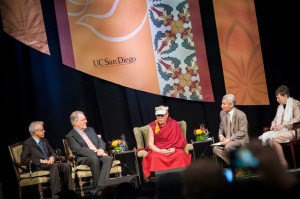
Thereafter, as per the tradition established by His Holiness with events connected with him, the organizers made a financial statement. He said no public fund was used to bear the expenses connected with the visit. The total income as of April 17, 2012 from the events was $ 574,000 and the expenses to date were $527,000. The organizing committee’s representative made it clear that His Holiness the 14th Dalai Lama does not charge a speaking engagement fee and no aspect of His Holiness’ visit is being used to profit financially. He added that any funds raised through sponsorships and tickets sales will be used only to cover expenses for the events. Any surplus fund from the events will be disbursed to national and international charitable organizations. The organizers presented Ven. Tenzin Dhonden, Chair of the Organizing Committee, with a citation appreciating his contribution.
Following lunch, His Holiness met a group of people from the Kumeyaay tribe of Native American people. They performed some songs and dances to welcome His Holiness in their tradition. They also expressed their understanding of and support for the Tibetan people based on their own experience with their homeland in theUnited States. His Holiness advised them on the importance of getting good modern education and at the same time preserving their culture and language. He suggested that they think of devising a written script to promote and preserve their culture and language. He also said people could learn from the Māori people ofNew Zealandas they are the most advanced among indigenous people.
Thereafter, His Holiness went to the Scripps Institution of Oceanography and participated in a discussion with scientists titled, “Neuroscience and the Emerging Mind: A Conversation on Human Consciousness and Compassion.”
This panel discussion was a collaborative effort between the threeSan Diegouniversities to engage His Holiness in a conversation on human consciousness, from both scientific and philosophical perspectives.
His co-panelists were Dr. Jennifer Thomas, Professor of Psychology, San Diego State University; Dr. V.S. Ramachandran, Director of the Center for Brain and Cognition, University of California, San Diego; and Dr. Larry Hinman, Distinguished Professor of Philosophy, University of San Diego.
In his welcome remarks, Dr. William Mobley, Neuroscience Department Chair, UC San Diego, said, “Much has been written and said of this extraordinary man, Tenzin Gyatso, the 14th Dalai Lama. That many dimensions of human experience that have engaged His Holiness is well known. But it is in the juxtaposing his experiences and titles that one begins to understand him.
“He is called the Reincarnation of the Compassionate Buddha – but he thinks of himself a simple monk.”
“He is a spiritual leader, but also a powerful advocate for scientific research.”
“He is a man of peace, but also a man who relentlessly pursues justice.”
“A person of this place and time, but equally a man for all places and all times.”
He referred to His Holiness’ relationship with Prof. Bob Livingston, his predecessor atUniversityofCalifornia,San Diego.
Dr. Mobley also recognized Dr. Thupten Jinpa Langri as “a dear friend and colleague.”
His Holiness and the scientists engaged in a very deep discussion about the nature of brain during different aspects of human action and emotion.
His Holiness departsSan DiegoforLong BeachonApril 20, 2012morning to begin his programs there with the Gaden Shartse Thubten Dhargye Ling.
